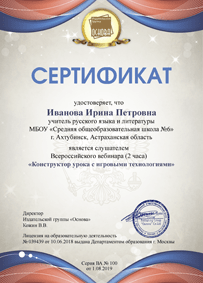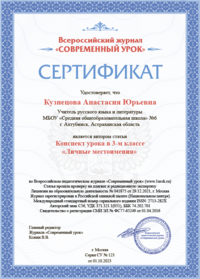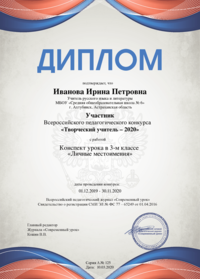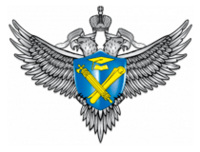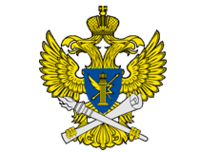Конспект урока английского языка в 6 классе «The party of irregular verbs. Present perfect & past simple»
Автор: Хортива Елена Владиславовна
Организация: ГУ ЛНР «Луганский УВК им. лётчика-космонавта Г.Т. Берегового»
Населенный пункт: ЛНР, г. Луганск
ЦЕЛЬ УРОКА: Совершенствование грамматических навыков обучающихся (употребление структур Present Perfect и Past Simple Tenses) в устной и письменной речи.
ЗАДАЧИ УРОКА
обучающие:
- актуализировать знания обучающихся о многообразии неправильных глаголов в английском языке и особенностях их употребления в устной и письменной речи;
- активизировать и систематизировать грамматические навыки обучающихся в употреблении структур Past Simple и Present Perfect Tenses и их контрастировании;
- совершенствовать умение группового общения, навыки диалогической и монологической речи, аудирования, драматизации.
развивающие:
- способствовать развитию личностных, познавательных, коммуникативных и регулятивных универсальных учебных действий;
- развивать оперативный, долговременный и слуховой виды памяти;
- развивать интерес обучающихся к познавательной деятельности;
- стимулировать интерес к изучению иностранного языка.
воспитательные:
- развивать умения сотрудничества в образовательной деятельности;
- способствовать осознанию возможностей самореализации средствами иностранного языка.
Средства обучения: компьютер, проектор, презентация, раздаточный материал (карточки с грамматическими заданиями), постеры-кроссворды. Урок может быть проведен с использованием мультимедийной доски или в компьютерном классе (в таком случае карточки с грамматическими заданиями и кроссворды используются как электронные приложения)
PRCEDURE
I.INTRODUCTION
Teacher: - Good morning, dear friends! Glad to see you! Today we are going on mastering our grammar skills. To begin with, let`s speak a little about irregular verbs. Well, I want to ask you some questions. Please, answer them.
- Do you think the irregular verbs are important for those who want to know English well?
- Is it difficult or easy to learn irregular verbs and why?
- Do you know how many irregular verbs there are in the English language?
Thank you for your answers. Of course, speaking English is impossible without good knowledge of irregular verbs. At the same time, everybody knows that the only way to master them is to learn all their forms by heart that is not an easy task. In order to make your learning more interesting I want to tell some interesting facts about irregular verbs. Moreover, there are a lot of funny poems that can help you to memorize irregular verbs easily. Our students prepared some of them. Well, let`s start and see how well you know irregular verbs.
II. MAIN PART.
Pupil 1: Really, there are only about three hundred irregular verbs in the English language, much fewer than regular verbs, but we use them much more often. Once the English Queen signed the low abolishing irregular verbs but Parliament did not adopt it.
Pupil 2: So, as you see, to do well in English one should know irregular verbs well. That is why our children have prepared some interesting poems that can help you to memorize irregular verbs easily and remember them better. Listen to them, please!
Pupil 3: МОЙ ДЕНЬ
Обычным утром по телефону
Speak-spoke-spoken.
Чай попил я Drink-drank-drunk,
Немножко в душе Sing-sang-sung.
Случайно вазу Break-broke-broken,
Про все Forget-forgot-forgotten.
В школу быстро Go-went-gone,
А солнышко мне Shine-shone-shone.
Pupil 4: Придя из школы Eat-ate-eaten,
Меня котёнок Bite-bit-bitten.
Потом уроки Learn-learnt-learnt,
О смысле жизни Think-thought-thought.
Затем пора мне Sleep-slept-slept,
Ну, всё фантазий больше нет!
Pupil 5: В ШКОЛЕ
По утрам будильник громкий
Пробуждает wake-woke-woken.
Принимаю в быстром темпе
Душ холодный take-took-taken.
Чай наполнил мой стакан,
Пью его я drink-drank-drunk.
Взяв портфель свой в руки полный,
Мчусь я в школу go-went-gone.
Pupil 6: Первым делом, зайдя в школу,
Класс ищу я find-found-found.
Meet-met-met своих друзей
Нету радостнее дней.
Класс нас снова заморозил,
Зимним духом freeze-froze-frozen.
Learn-learnt-learnt английский мы,
Не боимся мы зимы.
После eat-ate-eaten очень быстро
Приходят радостные мысли.
Звонит громко наш звонок…
Ring-rang-rung. Хорош денек!
Pupil 7: УРОК
Звенит звонок ring-rang-rung,
Начат урок begin-began-begun,
Учитель come-came-come в класс,
Учитель see-saw-seen нас.
Sasha read-read-read,
Anya sweep-swept-swept,
Rostik spit-spat-spat,
Valera sleep-slept-slept,
Katya him wake-woke-woken,
Pupil 8: Olya по телефону speak-spoke-spoken,
Lera sing-sang-sung,
Nastya coffee drink-drank-drunk,
Viki draw-drew-drawn,
Ira eat-ate-eaten,
Arina hide-hid-hidden,
Vova write-wrote-written,
Vlad and Sasha fight-fought-fought-
Вот и кончился урок.
Pupil 9: SPORT
Все люди в мире знают what?
Что дети очень любят sport.
Одни бегом спешат на court,
Другие на sports ground.
Для них везде занятия
Can be find-found-found.
Pupil 10: Мальчики любят do-did-done дзюдо,
Мужчины fight-fought-fought бушидо.
Девчонки make-made-made рекорды,
Их мамы покупают им сноуборды.
А я люблю лишь swim-swam-swum,
И не люблю я run-ran-run.
И вывод мы make-made-made должны:
Все виды спорта нам важны!
Teacher: Thank everybody. Do you like the poems? I think such simple funny poems is a good helping hand when you learn the forms of irregular verbs.
And now, we will see how well you know irregular verbs. We have prepared some interesting crosswords. Let us do them. The pupil who is the first to raise the hand for the answer has the right to answer the question. He or she goes to the blackboard, takes the marker and fills in the crossword with the appropriate form of the verb. If the answer is right — you get one point, if it’s wrong — we ask the pupil who is the second to raise the hand and so on till we get the correct answer. Doing the first crossword we will check our knowledge of the second form of irregular verbs. Look at poster 1 (Приложение № 1) on the blackboard and get down to work.
Teacher: Well, you proved that you know the second form of irregular verbs well. One more question for you then.
- When do we use the second form of irregular verbs?
Right, speaking about events in the past in Past Simple Tense. So, let us practice using Past Simple.
Take Card 1 and do the task, please. Fill in the blanks with the correct verb form in Past Simple.
|
Card 1. Fill in the blanks with the correct verb form in Past Simple. Wash, read, swim, eat, break, go, buy, write, be, see
10) My friends… a magazine last month. |
Teacher: Let us see our results now. Please, change the papers with your desk mate. I want you to check the works of each other, make a mark if the sentence is right or wrong, correct and comment the mistakes if there are some and count the points.
(The pupils are working.)
Teacher: Well, our second crossword now. We should fill it in with the third form of given irregular verbs. Look at poster 2 (Приложение № 2). Let us do it.
(The pupils are doing the second crossword)
Teacher: I see now that you know the third form of irregular verbs very well too. Another question for you then.
- When do we use the third form of irregular verbs?
Right, we use the third form of irregular verbs in Present Perfect Tense. Your next task is to take Card 2 and put the verbs into Present Perfect.
|
Card 2. Put the verbs into Present Perfect.
5) She (to do) … the homework. 6) I’m afraid I (leave) my book at home. 7)…the secretary (yet/come)?
9)…you (ever/be) to Italy? 10)…you (have) a holiday this year? |
Teacher: Let us check the works and see how well you managed with Present Perfect Tense. I want you to read the sentences you have got in chain and help each other if something is wrong.
(After finishing checking the pupils’ works)
Teacher: Well, the most important task of our lesson now. To do well in English you should clearly understand the difference in using Present Perfect and Past Simple Tenses. Before we start working with Card 3 I want us to remember this difference.
(The pupils are explaining the difference in using Present Perfect and Past Simple Tenses)
Teacher: You are right, Present Perfect is not used when there is an indication of past time in the sentence. It is Past Simple that is used in this situation. Now I want you to demonstrate how well you understand this difference. Please, take Card 3 and do the task.
|
Card 3. Chose the right variant Present Perfect or Past Simple.
A didn’t have B haven’t had C hadn’t have
A have been B were C having being
A have bought B bought С had bought A haven’t worn B wore C didn’t wear
A did it stop B is it stopped C has it stopped
A sended B have sent C sent
A losed B have lost C lost A have had B had C have
A When had Jill finished B When has Jill finished C When did Jill finish
A have always been B was always late C had always been
A took B takes C has taken |
Teacher: Now give me your papers, please. I will check the works and tell you the results at our next lesson.
III. SUMMARY
Teacher: Our lesson is going to be over in a few minutes. You have worked hard today. We have revised a lot.
- Did you like the activities?
- Do you think they were useful for you?
- Were they difficult?
- What activities did you like best of all?
I’m satisfied with your work and answers at the lesson today. Many pupils were at the top of their abilities but some were too shy. I think it is better to do something and make mistakes than to keep silence. I hope you will take my advice into consideration next time. Your marks are the following… Thank you for your work. Your home task is … Our lesson is over.
Полный текст статьи см. приложение

